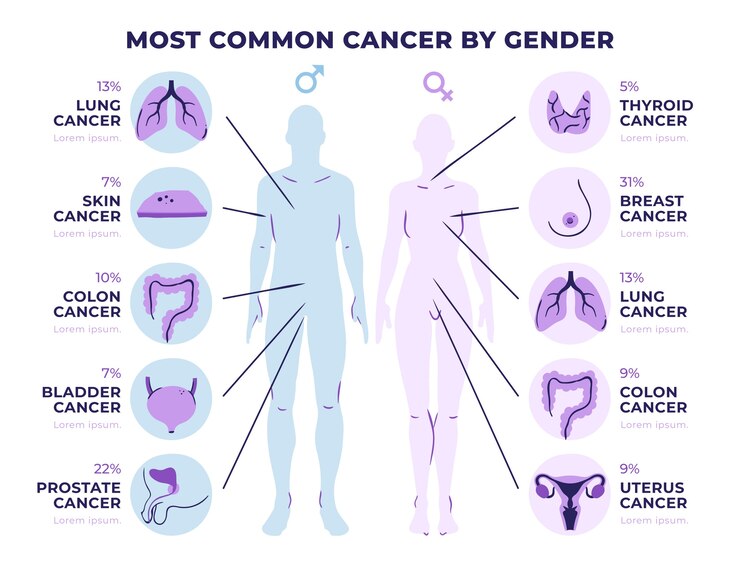Table of contents
- Understanding CBD and Its Interaction with Cancer Cells
- 1. CBD and Breast Cancer
- 2. CBD and Lung Cancer
- 3. CBD and Brain Cancer (Glioblastoma)
- 4. CBD and Prostate Cancer
- 5. CBD and Colorectal Cancer
- What Current Studies Say
- How Patients Are Using CBD During Cancer Treatment
- 5 FAQs About CBD and Different Types of Cancer
- Final Thoughts
As the interest in alternative and complementary treatments continues to grow, CBD (cannabidiol) has emerged as a noteworthy compound in the realm of cancer research. Extracted from the cannabis plant, CBD is non-psychoactive and known for its potential therapeutic properties. Among the most intriguing areas of research is its impact on various types of cancer.
This blog post dives into the latest studies and findings regarding CBD’s effects on different types of cancer, aiming to provide an informed look at what science says and how patients are responding to this natural compound.
Understanding CBD and Its Interaction with Cancer Cells

CBD interacts with the endocannabinoid system (ECS), a complex cell-signaling system in the body that plays a role in regulating pain, immune response, mood, and cellular health. This interaction is believed to be responsible for CBD’s ability to potentially:
- Inhibit tumor growth
- Prevent cancer cell metastasis
- Induce cancer cell apoptosis (programmed cell death)
- Improve quality of life during treatment
Let’s take a closer look at how CBD is being studied across different types of cancer.
1. CBD and Breast Cancer
Several in vitro and animal studies have explored how CBD may affect breast cancer cells. The findings suggest that CBD can reduce the proliferation of cancerous cells, particularly in aggressive forms like triple-negative breast cancer. In some studies, CBD has induced apoptosis and inhibited tumor cell migration, potentially preventing metastasis.
2. CBD and Lung Cancer

Studies examining CBD’s effects on non-small cell lung cancer (NSCLC) have found that it might suppress tumor growth and enhance the efficacy of certain chemotherapy agents. It also shows potential in reducing cancer cell viability and blocking the pathways that lead to cancer spread.
3. CBD and Brain Cancer (Glioblastoma)
Glioblastoma is a highly aggressive brain cancer with limited treatment options. Recent research has explored CBD as a possible complementary therapy, noting its potential to impede tumor cell proliferation and increase survival rates in animal models. When combined with THC or traditional therapy, CBD may also enhance apoptotic effects in glioblastoma cells.
4. CBD and Prostate Cancer
CBD has shown the potential to affect prostate cancer cells by inhibiting androgen receptor expression and reducing cell viability. Some preclinical studies suggest it may slow cancer progression and offer symptom relief, although more clinical trials are needed to support these findings.
5. CBD and Colorectal Cancer
Early-stage studies on colorectal cancer indicate that CBD could reduce inflammation in the gut and promote apoptosis in colon cancer cells. This dual action may be especially beneficial for managing inflammation-driven cancers like those affecting the digestive tract.
What Current Studies Say
Although many of the current findings are based on lab and animal models, human trials are gradually increasing. Researchers are particularly interested in CBD’s synergistic effects with chemotherapy and radiation, its potential for pain and nausea relief, and its role in improving patients’ quality of life.
The growing body of research into CBD and various types of cancer is promising, but it’s crucial to remember that CBD is not a cure. It should be considered as a complementary approach, not a replacement for conventional cancer treatments.
How Patients Are Using CBD During Cancer Treatment
Cancer patients often use CBD for:
- Managing chronic pain and inflammation
- Alleviating nausea and vomiting from chemotherapy
- Improving appetite and preventing weight loss
- Supporting better sleep and reduced anxiety
- Enhancing overall quality of life during treatment
Forms include CBD oil, capsules, topicals, and edibles, with dosing tailored to individual needs and treatment plans.
5 FAQs About CBD and Different Types of Cancer
CBD has shown potential in lab studies across multiple cancer types, including breast, lung, prostate, and brain cancers. However, clinical evidence is still limited, and results can vary.
Yes, but only under the guidance of a healthcare provider. CBD may interact with certain medications, so it’s essential to coordinate its use with your oncology team.
While CBD is generally considered safe, it may cause side effects like fatigue, diarrhea, or appetite changes. It can also interact with medications metabolized by the liver.
There’s no universal dose. Most experts recommend starting low (e.g., 10–20 mg per day) and adjusting gradually while monitoring for side effects and benefits.
There is no conclusive evidence that CBD can prevent cancer. Current research focuses more on symptom relief and tumor suppression in existing cancer cases.
Final Thoughts
As science continues to explore the role of CBD in different types of cancer, the outlook is cautiously optimistic. From reducing inflammation to possibly suppressing tumor growth, CBD is proving to be a valuable candidate in the field of integrative cancer care.
While we await more definitive human studies, cancer patients and researchers alike are watching closely. If you’re considering using CBD, make sure to consult with a healthcare provider, especially during active treatment.





